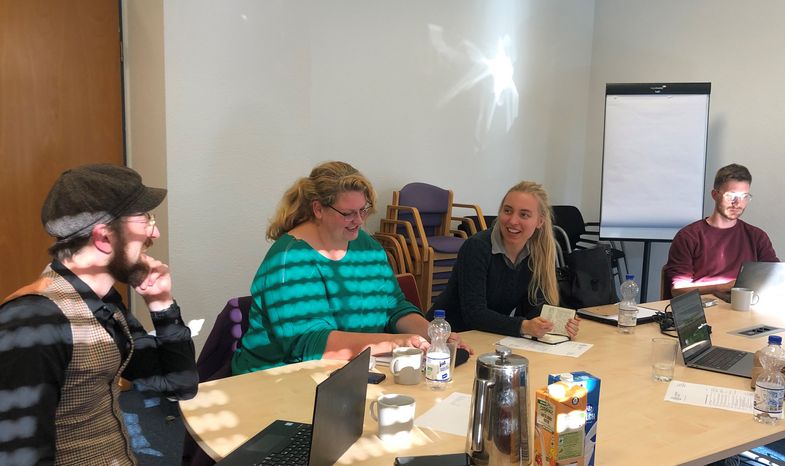Cultural arts education in rural areas... what is it really? And how can it be researched? On October 14, 2022, doctoral students from all over Germany came together for the KuBiLand research workshop. The scientific assistant Thi Huyen Trang Le led the format, which was organised by the MetaKLuB project. The day was characterised by intense exchange on doctoral projects focused on cultural education in rural areas. After a round of presentations on the current state of research projects, there was an intense exchange on the various research projects. All the doctoral projects are based on research projects from the funding guideline and are therefore part of the multifaceted view of rural cultural arts education in Germany.
Cultural arts education? In rural areas?
The presented research projects range from quantitative field exploration to qualitative case studies and comparative problem analysis to a comprehensive overview with a mixed methods approach. Clearly, as diverse as the landscapes of cultural arts education are the ways of exploring them. So where to start? How to delimit? Who to ask? How to evaluate? These and more in-depth questions were discussed in detail.
Comparability or detailed perspective
A recurring discussion topic was the difficulty of finding the right level of abstraction. For example, when comparing several study regions, categories are needed that can reflect regional similarities or contrasts. This inevitably leads to a reduction of details from the individual cases on site. However, since the presented projects want to be fair to the perspective of the studied actors of cultural arts education, the local peculiarities must be adequately complexly depicted.
The right fit
Illuminating the research object correctly is not as easy as can be seen in an example: In a quantitative comparison of cultural arts education in one of the projects, it quickly became clear that the statistical categories "central" and "peripheral" of the Federal Institute for Research on Building, Urban Affairs and Spatial Development are not realistic with regard to the practice of cultural education. These categories are based on the accessibility of the nearest center by car. A hundred-soul village near the highway is therefore considered central, while a poorly connected, medium-sized city is considered peripheral - even if the latter blooms with cultural life while the former is limited to the fishing club. The categories do not reflect the cultural contrast between urban and rural here, but rather the accessibility by car. The right fit between research categories and the phenomena being studied is therefore a central issue in research on cultural arts education in rural areas.
Cultural arts education is not a neutral term
As an urban concept that derives from political-administrative practice, cultural arts education is linked to funding, public agencies, and the practice of regional governance. This affects its research: For example, it has been found that the term cultural arts education does not appear in the self-description of the surveyed actors. Is this then a suitable analysis category? Can the term be separated from the complex power imbalance between city and country that surrounds it in political reality? Researchers must absolutely reflect on their own position if the reality of those being researched is not to be distorted by an "urban lens." Nonetheless, research can confidently make reliable statements about the research objects through methodological professionalism and constant questioning.
Confident research
All the research projects discussed focus on the practical actions of KuBi actors in rural areas. This provides insights into the needs and obstacles, but also the success recipes for cultural arts education practice in the countryside, which are not possible through the lens of urban cultural policy. Cultural arts education is not researched in a vacuum, and precisely because cultural arts education is closely linked to the practice of political administration, social science can use its reflective distance from the research object here to identify recognized power imbalances. This can mean giving confident recommendations for supporting rural cultural arts education, for example, in order to incorporate scientific knowledge into the public debate and cultural education policy.
What's next?
The MetaKLuB meta-project supports the networking of the funded projects with each other. In this spirit, the KuBiLand research workshop opened a space to discuss cross-cutting issues, advise each other from different research perspectives, and develop ideas together. The location- and method-crossing approach aims at exchange and synergy effects between the research projects. Therefore, a transfer conference was planned for next year at the end of the day. There are already a lot of ideas for further exchange on the then largely completed research projects. This is intended to secure the future transfer of knowledge between researchers and beyond science.
